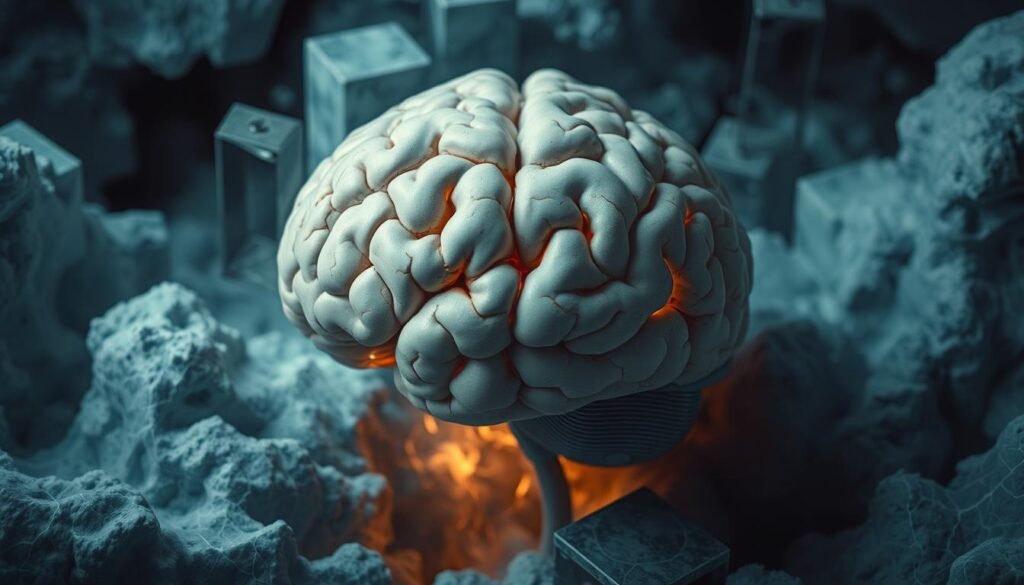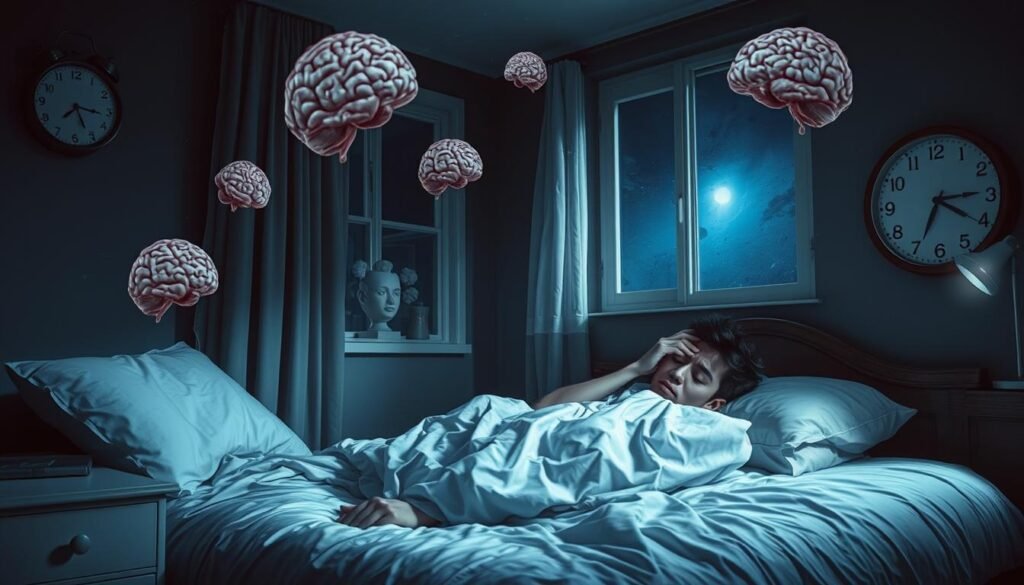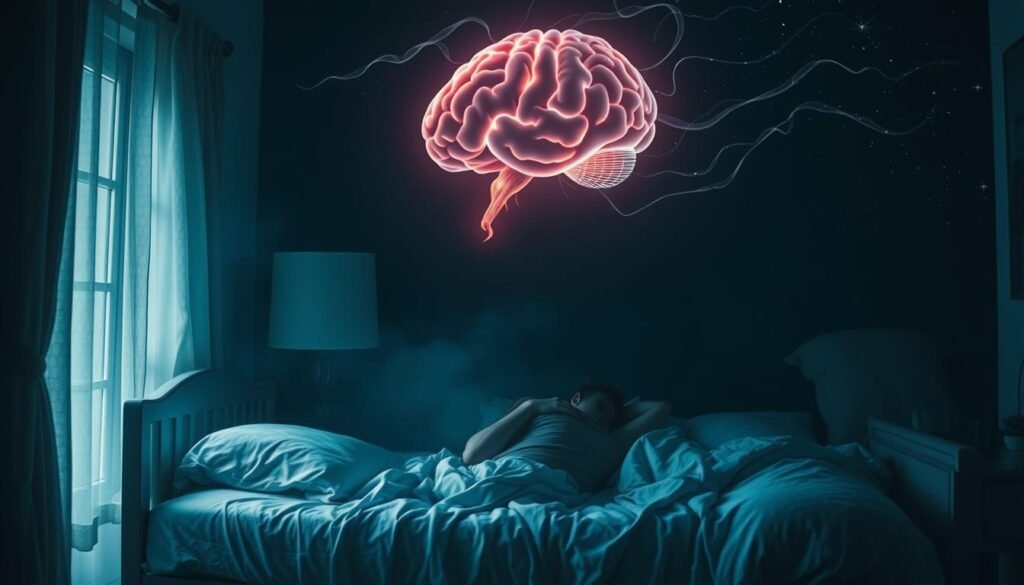It’s surprising, but true. Recent studies found that having moderate-to-severe insomnia increases the risk of getting a sports-related concussion. The risk jumps by an astonishing ratio of 3.13. Each year, over 2 million people in the United States suffer from traumatic brain injuries. This highlights how crucial it is to understand the link between concussions and problems with sleep.
Many wonder, can concussions cause insomnia? The impact of trauma on sleep can be significant. It affects one’s cognitive recovery and overall health. This article explores how concussions affect sleep and the symptoms that often come with these injuries. It aims to share important information with doctors and patients.
Key Takeaways
- Moderate-to-severe insomnia increases sports-related concussion risk significantly.
- Excessive daytime sleepiness may also elevate the likelihood of sustaining a concussion.
- Traumatic brain injuries result in many individuals experiencing sleep disturbances.
- 67% of patients with traumatic brain injuries report excessive daytime sleepiness.
- Many sleep issues linked to concussions can persist long-term, even after the injury has healed.
- Doctors may need specialized tools to identify sleep disturbances in concussion patients.
- Awareness of sleep problems is crucial for improving recovery outcomes in patients with traumatic brain injuries.
Understanding Concussions
A concussion is a brain injury caused by a hit to the head that changes how the brain works. People might feel confused, have headaches, feel dizzy, and have trouble remembering things. It’s important to know what causes these injuries. This helps in preventing them and treating them quickly.
What is a concussion?
Concussions can be mild or severe, but they always affect the brain for a while. Although most people get better, some have long-term problems. For example, concussions can mess up how you sleep. Many wonder if concussions can lead to insomnia. Also, people with concussions might be very sensitive to light and sound, making it hard to get better.
Common causes of concussions
Concussions can happen in different ways, such as:
- Sports injuries
- Vehicle accidents
- Falls
- Domestic violence
Every year, about 3.3 million mild brain injuries are treated in U.S. emergency rooms. This fact shows how important it is to be aware of dangers in daily life. Stopping these injuries can greatly lower the risk of problems, including sleep issues from concussions. To learn more about how concussions affect sleep, this study provides great insights.
The Impact of Concussions on the Brain
Concussions affect the brain in complex ways. They can mess with your sleep and more. After a hit to the head, things in the brain start to work differently. This can lead to trouble thinking, moving, and even changes in mood. The reason? The production of important brain chemicals gets thrown off.
Neurology of traumatic brain injury
A traumatic brain injury changes how the brain is wired. It can mess up how you sleep and feel awake during the day. People with severe injuries might feel very sleepy all the time. The amount of sleep you get affects how well you think. Too much or too little sleep, and your mind won’t work right. Keeping a regular sleep schedule helps your brain heal.
Potential long-term effects on health
Brain injuries can cause long-term problems. Issues like bad sleep, too much sleep, or even sleep apnea can last for years. Nearly half of people with mild concussions will keep having sleep troubles. These sleep issues can make it hard to remember things and pay attention. They can also lead to serious mood problems. Handling these sleep problems well is key to feeling better. For tips on dealing with concussion-related sleep issues, check out this resource here.

| Effect | Description |
|---|---|
| Sleep Disturbances | Includes insomnia, hypersomnia, and sleep apnea |
| Increased Sleep Needs | Patients may require more sleep following injury |
| Daytime Sleepiness | Excessive fatigue affecting daily activities |
| Cognitive Decline | Associated with both too much and too little sleep |
| Mood Disorders | Anxiety and depression frequently arise post-concussion |
Insomnia and Its Symptoms
Insomnia affects many people, especially after a concussion. It makes falling or staying asleep hard, leading to poor rest. People often find themselves awake at night or waking up too early. This affects their recovery and daily life.
What is insomnia?
Insomnia isn’t just trouble sleeping for a night or two. It can last over a year after a head injury. Concussion sufferers may also deal with other sleep issues. Between 30% to 80% of them experience sleep problems, showing how common this issue is.
Common symptoms of insomnia
- Difficulty falling asleep: It’s tough for many people to start sleeping, especially if they’ve had a concussion.
- Frequent awakenings during the night: Waking up often can make concussion symptoms last longer.
- Daytime fatigue: Not sleeping well leads to feeling tired, affecting daily tasks.
- Irritability and mood swings: Lack of sleep can make emotions unstable, worsening concussion effects.
- Concentration issues: Sleep troubles can harm thinking skills, complicating concussion recovery.
Sleep problems after a head injury can slow down healing. This shows why focusing on sleep issues is important in treatment.
Can concussions cause insomnia?
Many people struggle with insomnia after a concussion. About 30% to 80% face sleep issues after such an injury. They find it hard to fall asleep or keep waking up at night. This lack of sleep slows down recovery and worsens symptoms.
Research findings on insomnia after head injury
The risk of insomnia increases with the severity of the concussion. People waking up often during the night may feel concussion effects for longer. If not managed well, such insomnia could last for more than a year. This is especially true for kids, whose brains are still developing.
Patient experiences and testimonies
Many concussion sufferers share how their sleep patterns changed drastically. This led to them feeling very tired. Children under 18 with concussions took over two weeks longer to recover if they slept poorly. Sleep issues also affect mood and thinking. Recognizing this problem is key to finding better treatments. More information on this topic is available.

Concussion Effects on Sleep
It’s key to understand how concussions can affect sleep for those who have head injuries. Studies show about 60% of people with concussions face ongoing sleep issues. This rate is three times more than those without head injuries, showing a big concern.
Sleep disturbances in concussion patients
Many with concussions struggle to fall asleep, wake up often, and don’t sleep well. Headaches and being sensitive to light from these injuries make things worse. This can lead to more stress, releasing a chemical that keeps you awake and slows down recovery.
Fixing sleep problems is crucial. A study found those with concussion history were more likely to have sleep apnea by 18.6%. Research looking at 417 concussion patients showed a third had sleep issues, leading to much slower healing times. Sleep trouble means longer time to get mentally sharp again and to heal overall.
Influence of sleep quality on cognitive recovery
Good sleep is a big deal for healing the brain after a concussion. Poor sleep can make recovery take longer. School kids should get 10 to 11 hours of sleep, and teenagers should get about 9 to 9.5 hours. Right after the injury, it’s common for children to sleep more to help their brain and body heal.
To help recovery, stick to a regular sleep schedule and avoid caffeine. Setting up a bedtime routine, like a bath or reading, helps too. If you can’t sleep after 20 minutes, try something calming. To improve sleep, make your bedroom quiet, dark, and cool, and don’t use electronic devices in bed.
Dealing with sleep problems in concussion patients is key for recovery. It shows how closely sleep and brain health are linked.
| Statistic | Detail |
|---|---|
| Chronic Sleep Difficulties | 60% of concussion patients experience chronic sleep issues. |
| Sleep Apnea Prevalence | 18.6% higher prevalence in concussion patients than the general population. |
| Recovery Time Increase | 3- to 4-fold increase in recovery time for patients with sleep disturbances. |
| Recommended Sleep Hours – Children | 10-11 hours per night. |
| Recommended Sleep Hours – Adolescents | 9-9.5 hours per night. |
Post-Concussion Syndrome and Insomnia
Post-concussion syndrome often follows a concussion, lasting for weeks or months. It can cause headaches, dizziness, fatigue, and sleep problems. Many people with this syndrome struggle with insomnia, made worse by anxiety and cognitive issues. Around 30% start having insomnia shortly after their injury, highlighting the need to manage sleep troubles.
Understanding post-concussion syndrome
The syndrome includes lingering symptoms after the injury heals. Fatigue is common, affecting 43% to 73% of patients. Sleep is crucial for recovery and brain function. Poor sleep worsens symptoms. Studies from Cognitive FX show treatment can greatly improve symptoms, showing the value of managing them well.
Sleep problems associated with post-concussion syndrome
Those with the syndrome often find it hard to fall and stay asleep. Between 30% and 70% face sleep issues that may get worse. Sleep cycle changes and hormonal imbalances play a role. Good sleep habits are key to recovery. Keeping a regular sleep schedule and a cozy sleep space are good tips. For more advice, see sleep hygiene practices.

Brain Injury Impact on Sleep Disturbances
Brain injuries can lead to major changes in how we sleep. If someone has a traumatic brain injury, they might need over two more hours of sleep than before they were injured. This shows how a brain injury impacts sleep, making problems like insomnia worse.
How brain injury affects sleep patterns
Those who survive brain injuries often feel too sleepy during the day. They may fall asleep suddenly and without warning. Falling asleep, staying asleep, waking up too early, and feeling tired upon waking are common. Studies show that between 30% to 70% of people with traumatic brain injuries will have sleep issues, with insomnia being the top problem.
Connection between brain injury and REM sleep behavior disorder
Many survivors of brain injuries have intense and unsettling dreams. Those with post-traumatic stress disorder might have recurring nightmares, adding to their sleep troubles. The relationship between brain injury and concussions and sleep disorders also includes messed-up sleep cycles. This leads to sleep schedules that aren’t consistent. Plus, conditions like sleep apnea can make people wake up often during the night.
Managing Sleep Problems After Concussions
Solving sleep issues is key if you’ve had a concussion. It’s common to find sleeping hard after this injury. You may struggle to fall asleep or to feel rested. There are several ways to help fix these sleep problems.
Treatment options for insomnia post-injury
Treating insomnia after an injury can involve different methods. Methods like cognitive-behavioral therapy (CBT-I) have been effective. They help create better sleep habits. Along with therapy, people may try:
- Medications such as prescription sleep aids when necessary
- Mindfulness and relaxation techniques to ease anxiety and promote better sleep
- Lifestyle changes, including avoiding caffeine and keeping a consistent sleep schedule
Sleep hygiene practices for concussion recovery
Good sleep hygiene is vital for concussion recovery. These habits can improve sleep quality and health. Important tips include:
- Maintaining a consistent sleep-wake schedule
- Creating a peaceful sleeping environment by reducing noise and light
- Avoiding stimulants like nicotine and caffeine in the hours leading up to bedtime
- Engaging in relaxation exercises or calming activities before bedtime
Conclusion
The link between concussions and insomnia is getting more attention, showing how important it is for doctors and patients to know about it. Studies prove that concussions can cause insomnia. About 60% of folks with traumatic brain injury have sleep problems that affect their healing and life.
For people with Postconcussive Syndrome, 64% say they have trouble sleeping. This fact underlines how vital it is to get to know how brain injuries affect sleep. This knowledge helps doctors find the best ways to help patients get better. Insomnia does more than just slow down healing in the brain.
It can make depression and anxiety worse. This is shown by how closely insomnia and the severity of post-concussion symptoms are linked. Trying out non-drug treatments, changing how one lives, and keeping an eye on how medications affect sleep can help a lot.
With more research, there’s hope for new ways to fix the sleep problems concussion patients face. The medical world is digging deeper into this complex issue. It’s key for patients to get care that focuses on how crucial sleep is to their recovery.